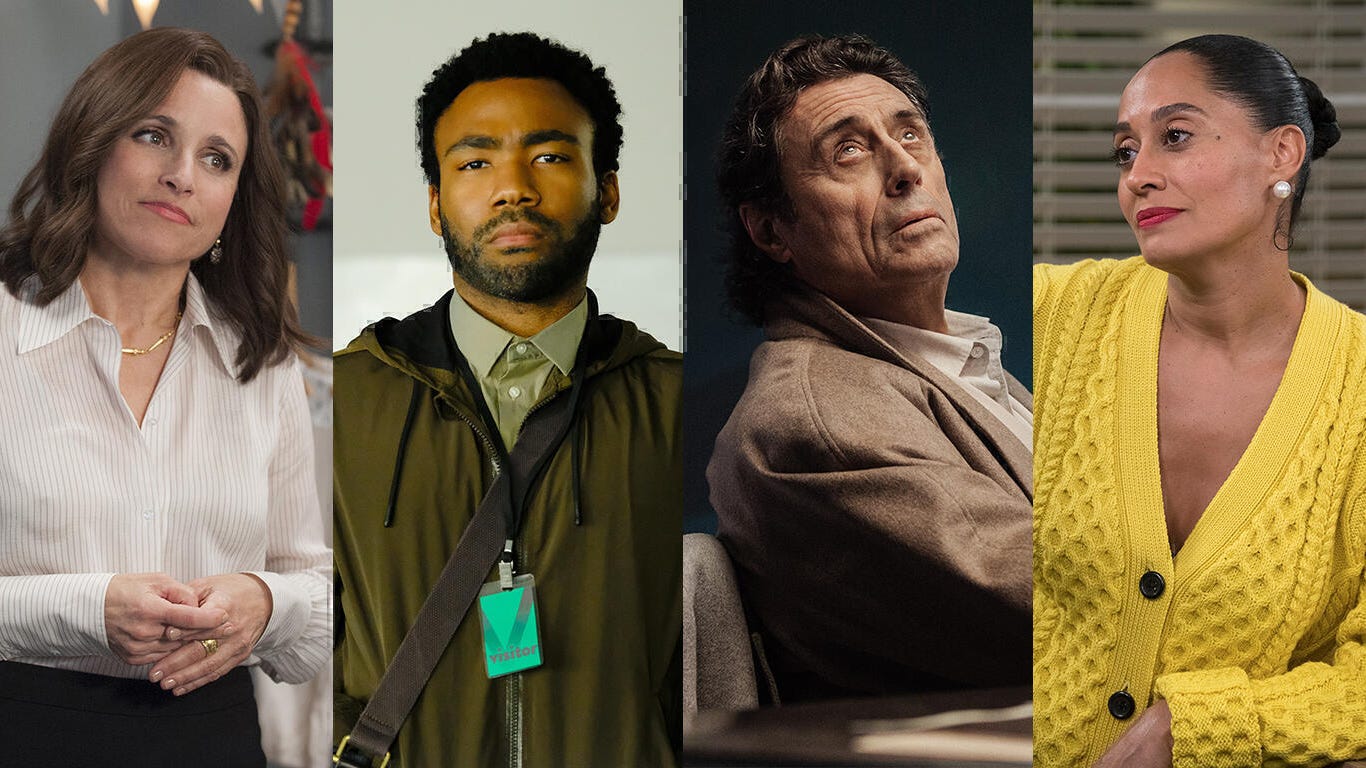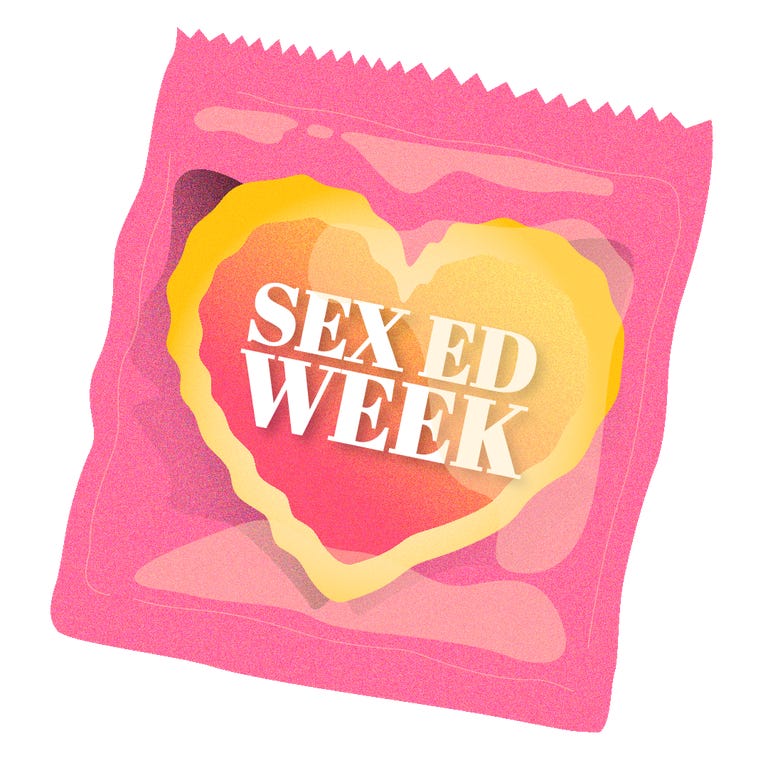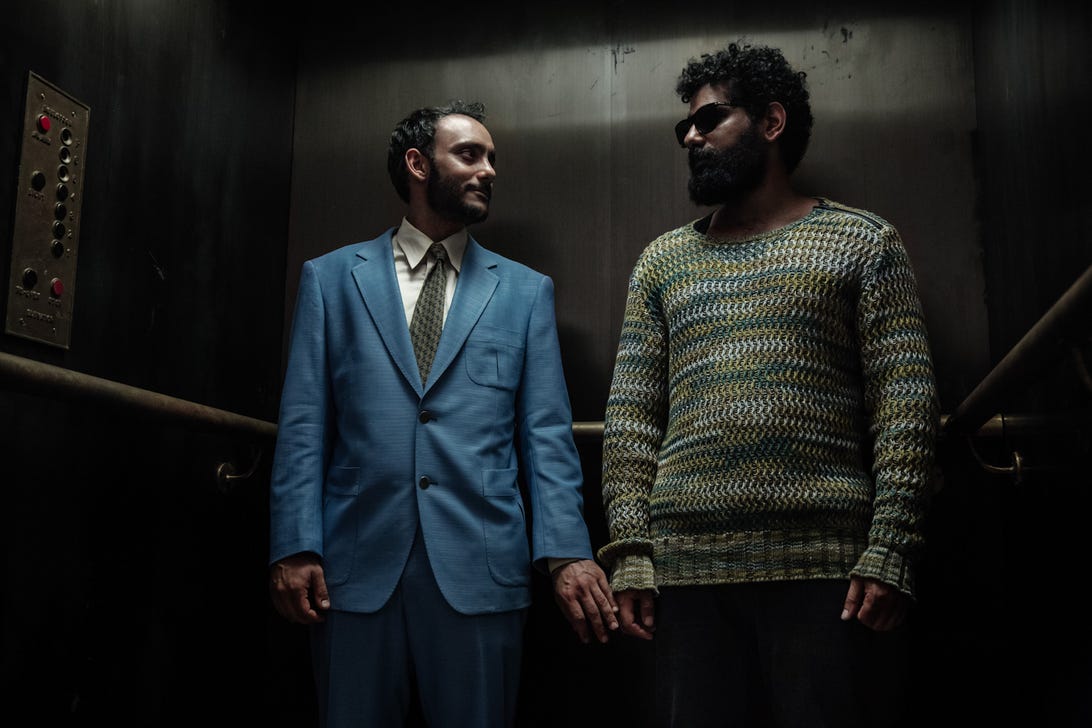
When It Comes to Sex and Profanity on TV, Where the F--- Do We Draw the Line?
TV Guide looks into the complicated, and often contradictory, rules of television censorship

What do comedy legend George Carlin and reality star turned actress Nicole Richie have in common? Here's a hint: a whole lot of sh-- involving the Supreme Court.
Way back in 1972, Carlin's naughty "The Seven Words You Can Never Say on Television" bit -- which outlined the swear words that are still taboo on broadcast TV to this day -- ended up causing the highest court to rule that the Federal Communications Commission had the authority to regulate what viewers see on broadcast media. But Carlin wasn't the only performer to change TV history. Some 30 years later, Richie was one of a few celebs who unintentionally triggered a Supreme Court case when the court ruled against the FCC's crackdown on rough language during live events; Richie, for the record, had said getting cow poo out of a Prada purse was "not so f---ing simple" on the 2003 Billboard Awards -- which actually sounds about right, but caused the FCC to get litigious once more.

Paris Hilton and Nicole Richie at the 2003 Billboard Music Awards
GettyThough the 2012 Supreme Court ruling which Richie's potty mouth helped provoke said the FCC's rules about language were too vague, clarity about what you can say and can't show on TV in the modern era remains elusive. Obviously, broadcast networks (ABC, NBC, CBS, Fox, and The CW) follow guidelines that are now so ingrained into the public consciousness that they're basically common sense; you'll never see the agents of NCIS call someone a "c--ksucker" or a bare-chested woman on Supergirl. But amid cultural changes that have made people more comfortable with salty language, as well as increased open-mindedness about sex and the rise of the no-holds-barred streaming services, sharp delineations of yesteryear are being sanded down, making today's rules a sometimes nebulous mix of old-school restrictions and self-restraint... or in some cases no rules at all. And the rules are changing by the day.
"The one major change no one ever expected was the graphic language coming from President of United States," said Ron Simon, curator at the Paley Center for Media. He referred to the two-hour speech by Donald Trump in March, during which Trump called Democratic oversight "bullsh--" -- language that had broadcasters and news outlets scratching their heads since, as Carlin noted, you're not supposed to say that on TV. Live TV, as Janet Jackson will tell you, is what usually gets people in trouble when they run afoul of the FCC. But on scripted television, parameters on what's considered indecent (sexual content) or profane (swearing) are closely monitored by standards and practices departments, which have been getting a run for their money as times keep a-changin'.
Let's Talk About TV's Evolving, Complicated Relationship With Sex
A few standards and practices professionals reached for comment declined to speak publicly but in talking with writers, producers, network executives and actors, TV Guide found that determining what flies, where and at what time is kind of a group effort, even if people butt heads over what should go into an episode and what shouldn't. (After 10 p.m. is the industry agreed-upon standard of when more risqué content is shown, because it's when children are less likely to be watching.) Though many producers, like black-ish and grown-ishexecutive producer Laurence Fishburne, who also stars in the former sitcom, relish in newfound freedoms, they exercise discipline and restraint in using it. "I'm very happy there's room for [explicit language] on network television," he told TV Guide, "but I don't know how necessary it is because there are so many platforms where you can do whatever you want."
He noted how one word in particular -- "bitch" -- is used so much now it's lost some of its bile. "It's like salt and pepper on a meal," he said, and not incorrectly; the New York Times reported back in 2009 that uses of "bitch" on primetime TV tripled between 1998 and 2007, and by 2012, the Los Angeles Times notes, it had become so commonplace on TV that ABC felt OK greenlighting a show with the word (sort of) in its title: Don't Trust the B--- in Apartment 23. (It's still not the most popular swear word though: that, according to the Parents Television Council's 2010 study, is a bleeped F-word. And guardrails serve another purpose besides protecting sensitive ears, Fishburne pointed out: "I think sometimes restriction is good because it forces you to be a bit more creative."
Of course, premium cable and streaming networks enjoy the most freedom, but even there, the story is often the first gut check for what's OK and what, as Eleanor Shellstrop might say, has no way forking way in hell of getting on TV.
"Veep made vulgarity an art form," said Paul Scheer, himself a prince of prickly shows including Veep, The League and currently Showtime's Black Monday, which is not only foul-mouthed but had a character plop a (prosthetic) penis on someone's shoulder to haze him in an episode. Veep illustrates how vulgarity (on good shows anyway) makes sense for the characters and setting rather than just existing for vulgarity's sake. And when Scheer does catch an instance in any show's script that seems gratuitous, he's quick to flag it. "You talk to the producer and director and say, 'I get what you're saying but I don't think this is right. In TV you're in such a committee... there's a writers' room. The chances of something getting to you that's truly awful that hasn't been flagged by four other people is low."
It's unlikely today that a television writer would have characters spit out offensive terms for minorities, people with physical limitations or the like -- and not just because of their own sensitivity toward these words, but also to spare the wrath of advertisers or special interest groups who could publicly mobilize and pressure the network too. Hence the late airtime and Mature Audiences label for shows like Atlanta on FX, which, to illustrate how tricky the rules can be, is cleared to sparingly use the F-word and the N-word between characters (since it's germane to the story) but not in music that plays in the background. But that's just language. Sex and nudity is a whole other nut to crack.
It's been almost 25 years since Dennis Franz caused a, um, stink by showing his booty on NBC's NYPD Bluein 1995. Unlike language, which has gotten more lax, similar nudity hasn't become as commonplace on primetime -- case in point, the FCC's decision to fine 44 ABC stations $1.4 million for airing a 2003 episode of the same show that, again, showed a butt, this one belonging to Charlotte Ross. A court overturned that ruling, but, not to be deterred, broadcast networks have bypassed rules by showing nudity blurred, in shadows, or pixelated, which experts say can be just as titillating as the real thing. And instances of this have risen a lot. Another PTC study saw an increase of more than 6,000 percent for full frontal nudity from the 2010-11 television season to the 2011-12 season. Going into 2020, it's hard to imagine a blurred breast or butt being much of a shock whether one agrees with seeing it or not.
Naturally, premium cable plays by different rules. But, even there, hardcore, penetrative sex is still off limits on even the randiest of shows. Some, however, have gotten damn near close -- especially on Starz, the pay cable and streaming power player with a penchant for showing male nudity. Outlanderand Vida have no qualms about letting limp dicks flop freely. And though hot, graphic sex scenes are a norm, Starz even blows past what we might've deemed shocking just 10 or 15 years ago on HBO, like talked-about scenes inPower and American Gods where, respectively, 50 Cent whipped out his johnson and, on American Gods, Brian Fuller oversaw the creation of the most intense and graphic man-on-man sex scene in the history of TV. When asked about rules or notes from the network in terms of what's OK on that network, one writer on American Gods told TV Guide pretty much anything goes before shrugging her shoulders.

Omid Abtahi and Mousa Kraish, American Gods
Jan Thijs / StarzIn the #MeToo era, there's so much sensitivity around sexual harassment on set that even the approach to creating sexual content has changed. "There's an abundance of caution," said Don Cheadle, who stars in Showtime's Black Monday. As it happens, Cheadle spoke with TV Guide weeks before the network canceled SMILF, which became embroiled in controversy after creator and star Frankie Shaw was accused of mishandling sex scenes on set. But even with an intimacy coordinator on House of Lies, on which the actor used to star, Cheadle said, it was incumbent on everyone on set to make sure participants, especially women, were comfortable with the demands of sex scenes, and their comfortability could change minute to minute.
Once, he said, "We had to shoot a scene three times because a woman thought she would be all good with it, but when it came time she was like 'I'm not all good,' and she broke down. Even though you said you knew what the role is, when it's, 'OK, take your shirt off,' it's uncomfortable. It's the biggest lie you can tell on camera, other than physical violence, that you're having sex. You're completely exposed." Very few people are perfectly OK on set nude or doing sex scenes, he said, and those few are well known for their unusual comfortability. "There are three or four of them who just walk around [with everything out] and you have to go, 'Could you put your robe on?' That ain't me."
129 Things Degrassi Taught Me About Sex, Dating, and Puberty
As streaming continues to expand into a terrain of boundless restrictions, limitations on what's offered may just come down to consumer taste -- and business. Netflix's creators delight in talking about the creative freedoms they enjoy, evident in nudity on shows like Sex Education and Orange Is the New Black. Even if Netflix's originals as a whole haven't earned the streaming leader a reputation for being as randy as say, old-school Cinemax, Netflix hasn't shied away from explicitly sexual content, most of it in its vast collection of films and frank documentaries on human sexuality. But Disney's service is coming soon, and Apple's forthcoming service has reportedly committed to making content free of profanity, nudity, drugs, sex, religious symbols, or violence, and these power players could set the tone for how services govern themselves in the years to come. At Amazon, a source told TV Guide, that if anything, its content might trigger more conversations about violence -- gun and explosion heavy shows like Tom Clancy's Jack Ryan come to mind -- even if, ironically, the FCC isn't as tough on violent content as it is sex and language.
So, much has changed -- and will keep changing. Especially as both the TV industry and culture at-large continue to evolve at the speed of internet. Consumers continue to march towards shiny, anything-goes streaming services, while the influx of more risqué reality programming and the advent of live streaming means the FCC's tight oversight gets less relevant by the day. As President Trump might say, regulating language going forward might just be a whole bunch of bullsh--.
This week, TV Guide is exploring television's relationship with sex, puberty, and everything in between. As part of Sex Ed Week, we're examining how TV continues to fail viewers when it comes to adult virginity, the many life lessons we learned from Degrassi, why Sex Education filters raunchy teenage life through a candy-coated aesthetic, and more. You can check out all our Sex Ed Week content here.
